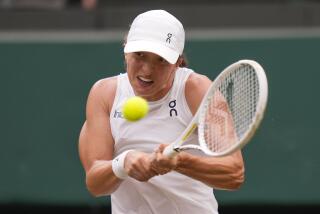WIMBLEDON TENNIS CHAMPIONSHIPS : Neither Grass Court Nor Connors Bounces Back : In His 2nd Straight 5-Set Match, He Falls to Kuhnen, Becker’s Practice Partner
- Share via
WIMBLEDON, England — Watching him the other day, in another of his epic battles, it was possible to believe that Jimmy Connors does not lose five-set matches. And then Tuesday he lost a five-set match, leaving this tournament, as real life rules dictate.
The man is two months shy of 36, hasn’t won this tournament since 1982, any tournament since 1984, and no longer means all that much to this new generation of players.
“He was an idol, but not the idol,” said Patrick Kuhnen, previously best known as Boris Becker’s practice partner until he upset the fifth-seeded Connors in the Wimbledon tennis championships.
Connors is becoming a piece of history, a walking, talking hunk of memorabilia. The museum here at the All England Lawn Tennis Club, and of course there is one, may as well incorporate him as an exhibit. Because when people such as Kuhnen, with little more than a serve and some crazy bounces, can beat him--it was 5-7, 7-6, 7-6, 6-7, 6-3--it may be time for the rest of tennis to move on. We have seen the past, and it is Jimmy Connors.
Connors played ably, of course, and never quit. He never does. A different bounce on Court 2’s chewed-up turf and maybe he would have survived this 60-game fourth-round match, as he did the other day in a 52-game, 5-set match against another 22 year old.
But the loss stopped him short of the quarterfinals, and any time he moves into semifinal country, as he did last year, he appears as a sentimental favorite only. He usually doesn’t beat anybody truly better than he, and now sometimes loses to players who aren’t.
He, too, is aware of the gap, the age gap anyway. Not that it means anything to him. Asked what he knew of Kuhnen, a West German ranked No. 89, Connors said: “I don’t know anything about anybody. They’re all 15 years younger. They talk a different language, listen to different music. They’re a different generation.”
It’s interesting that the rest of Connors’ generation is now appearing here in a circus act called the “35 and Over Gentlemen’s Invitation Singles.” Ilie Nastase and Roscoe Tanner played one another Monday.
Yet Connors did not notice them beckoning him to their particular retirement party. In fact, when somebody asked if he was now considering playing that circuit, Connors appeared to blank. “No,” he said evenly, “I don’t think I’d care to do that.”
The one thing Connors retains, that his age can’t seem to diminish, is his competitiveness. Perhaps he would have eventually scattered Kuhnen in a 16-14 tiebreaker, as he did Derrick Rostagno earlier. To watch Connors stalk the court, talking to himself--and, lamentably, the crowd--is not to doubt his drive. But sometimes things don’t go quite right. His combative character can only take him so far. It’s a long way, but not all the way.
Now he remains as a generational benchmark. You remember him and his two-fisted backhand and how he first won Wimbledon as a 21 year old. But you must remember, too, that he beat a museum piece on the way that year. Ken Rosewall, 39, went down swinging. It is doubtful that Connors, at 21, ever thought he’d be too old.
Still, Tuesday’s was a close and curious match, taking two days to complete. He and Kuhnen were tied at a set apiece Monday, the third set going to a tiebreaker. Connors was poised to serve in the misty gloom--play had been suspended on all other courts--and suddenly, out of the dampness, appeared these people.
“Four guys running after me,” Connors said. “People taking the net down, the umpire’s chair.” He shook his head. He was nearly tarped in mid-serve, a la Vince Coleman, as workers hurried to cover the court.
Even Kuhnen, whose experience at Wimbledon was so limited that he had no reason to expect one thing or another, was surprised.
Connors had built up momentum to that point, so the stoppage might have worked against him. He didn’t insist on that. Starting cold at the tiebreaker for the third set, he was knocked down, 7-4.
The two-time champion, a four-time semifinalist at that, Connors was unable to break Kuhnen, whose hefty serve kept him deep in his own court. In fact, Kuhnen had a match point on Connors’ serve in the fourth set. But Connors saved his serve and won the ensuing tiebreaker.
In the final set, Kuhnen broke Connors’ serve early, and it was downhill for Jimbo. Kuhnen won 14 of the last 15 points.
Afterward, Kuhnen desperately tried to downplay the notion that he was Boom-Boom’s bobo. “We practice two weeks a year,” he said of Becker. Perhaps, now that Kuhnen’s in a semifinal alongside Stefan Edberg, with this victory he can rise above that designation.
It is Connors who must worry about his reputation. But he remained feisty as ever, talking about the court’s condition--”It’s a pain in the . . . course and it’s a pain in the . . . to play.”
Yet, he quickly added, he wasn’t complaining. He even said: “I feel for the groundskeeper, and for everything he’s putting up with.”
Perhaps Connors has lost something after all. He couldn’t even put away a groundskeeper, sent to him like an easy lob.
Still, nobody seems able to put Connors away, not for good. He didn’t promise to be back, for Wimbledon No. 18. But he didn’t think this was his last, either.
“I’ve enjoyed it here,” he said, shrugging.
Apparently he aims to return to Centre Court before he’s enshrined in this tournament’s museum.
More to Read
Go beyond the scoreboard
Get the latest on L.A.'s teams in the daily Sports Report newsletter.
You may occasionally receive promotional content from the Los Angeles Times.










